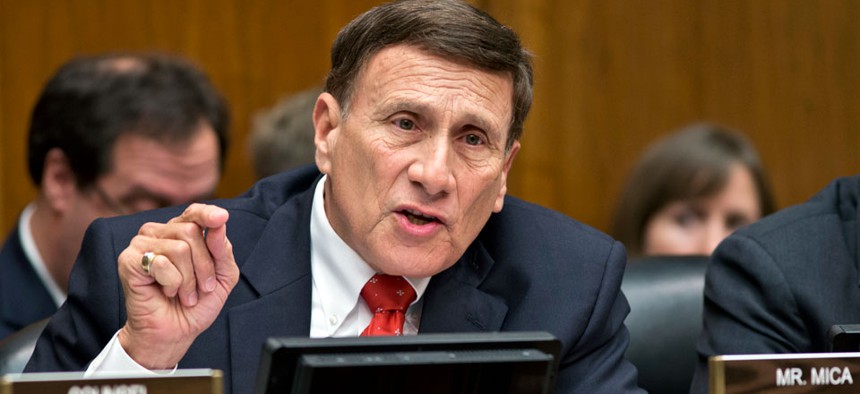
Rep. John Mica, R-Fla. J. Scott Applewhite/AP
Agencies’ $106 Billion in Improper Payments an Ongoing Briar Patch
Pentagon, HHS and IRS cite progress on prevention, new bid to detect fraud.
The good news is that the government’s estimated improper payments in fiscal 2013 came down from the previous year, by more than $1 billion. The less-good news is that estimated errors still amounted to $105.8 billion in fiscal 2013, with 78 percent concentrated in five agencies, the Government Accountability Office testified on Wednesday.
“It’s been $106 billion for each of the last five years-- a staggering half-trillion-dollars misspent,” said Rep. John Mica, R-Fla., chairman of the House Oversight and Government Reform Subcommittee on Government Operations, during a hearing with multi-agency witnesses. Citing a 25 percent improper payment rate in the Earned Income Tax Credit and $33 million in Medicare payments to “people behind bars,” Mica said, “It’s time to hold the folks in the federal government accountable. With this and other hearings, we will figure out a way to stem this.”
GAO Director of Financial Management and Assurance Beryl H. Davis testified that the new governmentwide estimate includes a net of 10 new programs added, for a total of 84 programs among 18 agencies. In Medicare alone, the bad payments amount to $64 billion. “The federal government's inability to determine the full extent to which improper payments occur and reasonably assure that appropriate actions are taken to reduce them,” she said, is “a material weakness in internal control.”
The Obama administration pointed to progress since it took office. “The improper payment rate was 5.42 percent in 2009 and was on the rise,” said Beth Cobert, deputy director for management at the Office of Management and Budget. “It has been significantly reduced to 3.53 percent,” she said, noting $22 billion in wrong payments recovered through audits. “But more work needs to be done.” She cited direct work with states, “careful analysis of program-specific corrective action,” leveraging of technology and program integrity proposals for health programs contained in the fiscal 2015 budget as part of the president’s management agenda.
Before hearing testimony from the Internal Revenue Service, Defense Department, and Centers for Medicare and Medicaid Services, full committee Chairman Darrell Issa, R-Calif., sought to discourage requests for additional funding to address improper payments. “This is a system failure, with self-inflicted wounds,” he said, noting that recent passage of the DATA Act should provide new opportunities to imitate the data mining techniques pioneered to track fraudulent spending under the 2009 Recovery Act. “It’s not about how much money you spend,” Issa said, “but what you’re ready to deploy.”
Rep. Gerry Connolly, D-Va., disagreed, saying, “It can’t be all about money, but on the other hand, money isn’t nothing.” He blamed Congress for cutting the IRS budget, stressing, however, the important “payoff” from whittling down the $106 billion error estimate, perhaps through greater use of U.S. attorneys in prosecuting fraud.
Internal Revenue Commissioner John Koskinen said, “I have personally devoted significant time to this important issue,” giving his agency more credit for reducing identity theft than for improper payments under the Earned Income Tax Credit. He spoke of an upward trend at the IRS in stopping suspicious tax returns, which reached 5.7 million returns in calendar year 2013. Those returns were worth more than $17.8 billion. He also noted a savings of $4 billion in the EITC. He said IRS had merged offices dealing with identify theft to a single unit and has capped refunds to any single bank account at three. But Koskinen did press Congress for more funds. “What you get is what you pay for,” he said, noting that the president’s budget proposes several non-monetary policy changes to accelerate fraud detection.
Asked by Mica whether an outside consultant had been brought in to help, the commissioner said only GAO and the inspector general.
Dr. Shantanu Agrawal, deputy administrator and director of the CMS Center for Program Integrity, cautioned that the numbers don’t tell the whole story. Medicare has a 10.1 percent rate of improper payments, he said, “but they’re not necessarily fraudulent or payments that shouldn’t have been made. They’re subject to coding and billing errors, and can be overpayments or underpayments,” he said. It’s not unusual to see insufficient or erroneous documentation in new programs, such as “face to face” screening of providers and suppliers. Corrected coding has saved $500 million in bad payments, he said. Under the Affordable Care Act, such screening has prevented $81 million in improper payments and revoked participation of 20,000 suppliers and providers. “We have put in critical safeguards,” he said. “We have a compressive strategy to address improper payments.”
Mark Easton, deputy chief financial officer at the Pentagon, said Defense Secretary Chuck Hagel and Comptroller Michael McCord are “fully committed” to achieving auditability, as well as to changing the improper payments situation over time -- even though GAO excludes many of the Pentagon’s numbers in its estimate due to unreliability. “Our record of minimal improper payments is noteworthy considering the size of the department,” Easton said. “We stand behind the numbers we report.” But given his team’s difficulties achieving auditable financial statements, he said he can understand “why people are skeptical.”
NEXT STORY: Your P.O. Box Just Got More Expensive







